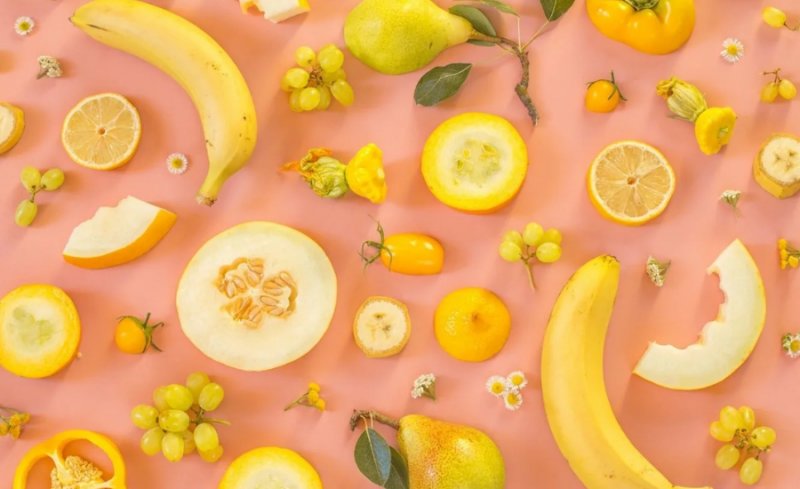
Welcome to a world of vibrant hues and natural goodness! Here at Smart Blogger, we are excited to delve into the captivating realm of yellow fruits and uncover the incredible health benefits they offer. From the radiant glow of a yellow banana to the tangy sweetness of a yellow mango, these fruits not only captivate our taste buds but also nourish our bodies from within. Join us as we peel back the layers of nutritional science and explore how incorporating yellow fruits into our daily lives can enhance our well-being and unlock a world of vitality. So grab a juicy yellow fruit of your choice and let’s embark on this flavorful and enlightening journey together!
Why Yellow Fruits Deserve the Spotlight
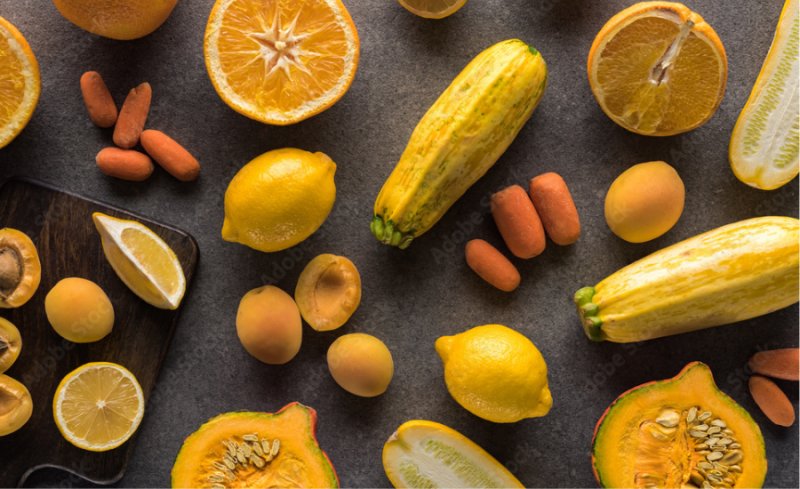
Due to their brilliant colors and health benefits, yellow fruits deserve attention. Golden gems of nature provide color and nourishment to our diets.
Yellow fruits’ nutritional content makes them stand out. Mangoes, bananas, and pineapples contain vitamin C, which enhances the immune system and encourages collagen production for healthy skin. Vitamin A, which promotes eye health and growth, is also found in yellow foods.
Antioxidants are another benefit of yellow foods. The brilliant yellow color comes from antioxidants like beta-carotene and flavonoids, which reduce oxidative stress and inflammation in the body. Heart disease, cancer, and age-related macular degeneration can be prevented by eating yellow fruits consistently.
Additionally, yellow fruits are delicious. From the rich sweetness of peaches and apricots to the acidic zing of citrus fruits, each bite is a flavor explosion. Yellow fruits satisfy our taste buds and improve our health.
The Nutritional Powerhouses
Yellow fruits are beautiful and nutritious. Let’s examine their three nutritional strengths.
Rainbow of Health Benefits
Beta-carotene and vitamin C give these fruits their bright yellow color. Antioxidants neutralize free radicals, lowering the risk of chronic diseases like heart disease, cancer, and inflammation. Dietary fiber in yellow fruits aids digestion and prevents constipation.
Essential Vitamins and Minerals Packed with
Yellow fruits contain crucial vitamins and minerals. Vitamins A and C are abundant. Vitamin A improves vision, immunity, and skin. Vitamin C boosts collagen formation, immunity, and antioxidant power. Potassium, magnesium, and folate in yellow fruits support heart, bone, and cell health.
Fighting Disease and Boosting Immunity
Yellow fruits enhance immunity. Vitamin C, rich in yellow fruits like citrus and mangoes, boosts immune function, reduces the severity of common infections, and speeds recovery. Yellow fruits’ antioxidants fight infections and illnesses by reducing inflammation.
Here Is A List Of 20 Yellow Fruits and their benefits
Bananas

Bananas, one of the most popular yellow fruits, are enjoyed worldwide. Bananas are sweet and healthy, with their bright yellow peel and creamy flesh.
Bananas are potassium-rich. Potassium is needed for heart function, blood pressure regulation, and muscular contractions. Bananas improve cardiovascular health and lower hypertension risk.
Bananas also provide great fiber. Fiber improves digestion and prevents constipation. Bananas are a good weight-loss snack since they fill you up.
Bananas include vitamins and minerals. They are rich in vitamin C, which boosts immunity and collagen formation for healthy skin. Bananas also include magnesium, which helps bones, and vitamin B6, which is necessary for brain development.
Bananas are versatile and healthful, whether eaten alone, blended, or baked. Their natural sweetness, convenience, and general availability make them a go-to energy boost or a nutritional snack. Bananas are delicious and healthy, so enjoy them.
Lemon

Lemons are known for their pleasant taste and versatility. Lemons are little yet potent in taste and health.
Lemons’ vitamin C concentration stands out. A splash of lemon juice provides a large dosage of this vitamin, which boosts immunity and antioxidants. Vitamin C promotes collagen formation, good skin, and wound healing.
Lemons alkalize the body, balancing pH and promoting well-being. They aid detoxification and kidney health as natural diuretics.
Lemons also add zest to food and drinks. Lemons enhance salads, marinades, lemonades, and cocktails.
Lemons bring flavor and health advantages to your daily routine whether used in cooking, as a garnish, or in a drink of lemon water.
Pineapple

Pineapple, a sweet and tart tropical fruit, delights the senses. Pineapples’ flavor and nutrients make them healthy.
Pineapples include bromelain, an enzyme combination that aids digestion. Protein digestion and bloating are improved by bromelain. Pineapples include dietary fiber, which aids digestion and bowel motions.
Pineapples are rich in vitamin C, which boosts the immune system, promotes collagen formation for good skin, and works as an antioxidant. Manganese, an antioxidant mineral, is provided by them.
Pineapples are delicious fresh, grilled, or in sweets and meals. Pineapples give a refreshing and tangy flavor to any dish, making them a healthy and tasty addition to your diet.
Yellow Apple

Yellow apples, with their crisp texture and vibrant color, are beautiful yellow fruits. They’re healthy and attractive.
Like red and green apples, yellow apples are high in fiber. Fiber increases satiety, digestion, and good cholesterol levels. Yellow apples enhance digestive health and overall well-being.
Vitamins and minerals are in yellow apples. They are rich in vitamin C, which boosts immunity and protects cells. Potassium, which is necessary for heart, nerve, and blood pressure health, is found in yellow apples.
Yellow apples’ somewhat sweet and acidic taste makes them versatile. Yellow apples bring flavor and nutrition to meals and snacks whether eaten fresh, added to salads, or baked into pies and pastries.
Yellow Pear
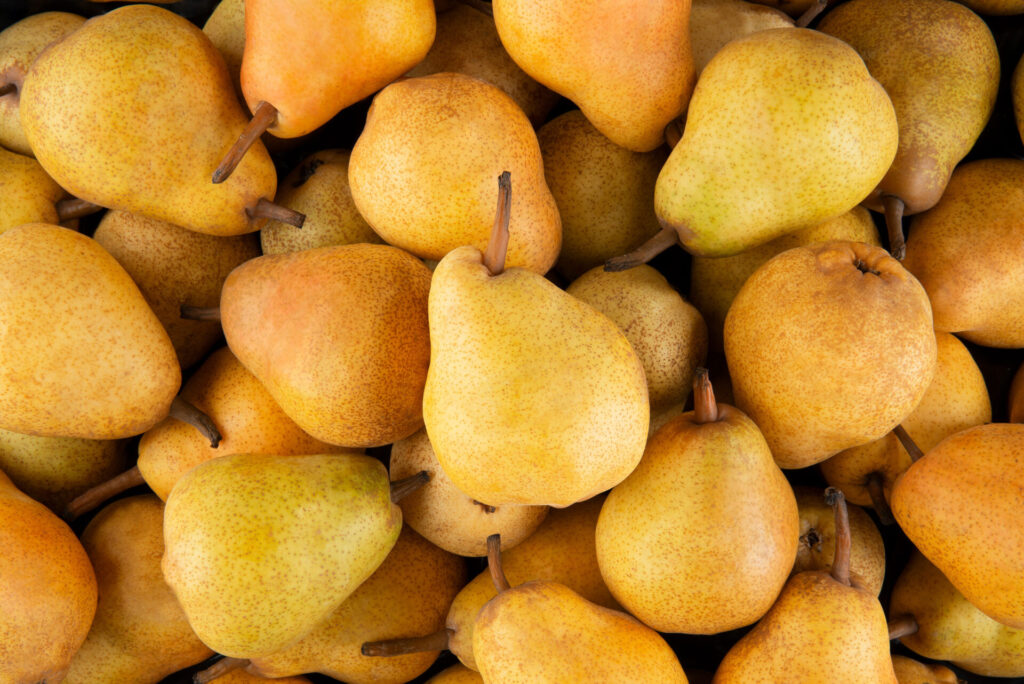
Yellow pears offer juiciness and smoothness to the yellow fruit family. These fruits are tasty and healthy.
Dietary fiber in yellow pears assists digestion, weight management, and fullness. They also include vitamin C, which boosts immunity, and vitamin K, which aids blood clotting and bone health.
Yellow pears also include potassium, which regulates blood pressure and heart health. Antioxidants like flavonoids protect cells from damage and inflammation.
Yellow pears provide sweetness and nourishment to salads, baked dishes, and even alone. Yellow pears are a nutritious and pleasant snack.
Apricot
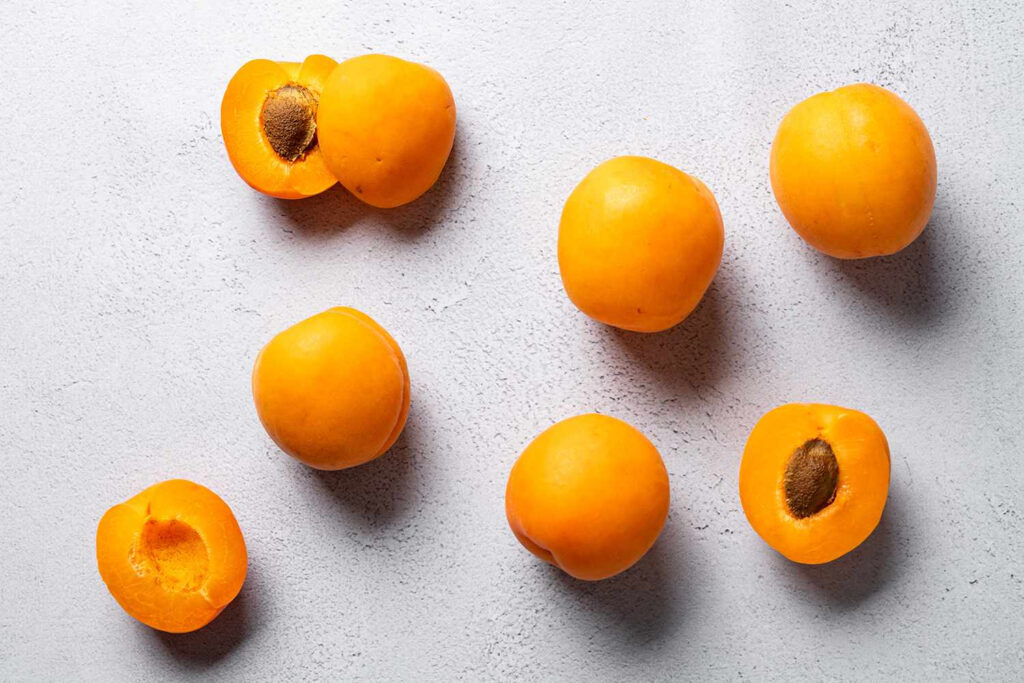
Apricots, the small and velvety yellow fruits, are packed with flavor and nutritional goodness. With their delicate aroma and sweet-tart taste, apricots are a true delight for fruit enthusiasts.
One of the standout qualities of apricots is their high concentration of vitamin A. This essential vitamin supports healthy vision, boosts the immune system, and promotes proper growth and development. Apricots also contain significant amounts of dietary fiber, which aids in digestion and helps maintain bowel regularity.
Additionally, apricots are a good source of antioxidants, including vitamins C and E. These antioxidants play a vital role in neutralizing harmful free radicals in the body, protecting cells from oxidative stress, and reducing the risk of chronic diseases.
Apart from their nutritional benefits, apricots are versatile fruit that can be enjoyed fresh, dried, or incorporated into a variety of dishes. They lend their distinct flavor to salads, desserts, and even savory dishes, adding a touch of sweetness and complexity.
Whether eaten on their own as a healthy snack or used in culinary creations, apricots bring a burst of vibrant flavor and a wealth of nutrients to the table. Embrace the golden goodness of apricots and savor their unique taste and nutritional benefits.
Yellow Watermelon

Yellow watermelon, a rare and visually stunning variation of the summertime fruit, offers a wonderful twist on the conventional watermelon experience. Yellow watermelon is tasty and nutritious.
Nutritionally, yellow watermelon is similar to red. Its high water content makes it a good summer drink for soothing thirst. Yellow watermelon also contains vitamins A and C, which boost immunological, skin, and overall health.
Compared to red watermelon, yellow watermelon is sweeter. For a refreshing and tasty treat, its flavor balances sweetness and juiciness.
Yellow watermelon adds color and flavor to any event, whether eaten alone, sliced into wedges, or blended into smoothies. Enjoy this enticing fruit’s delicious taste.
Golden Kiwi
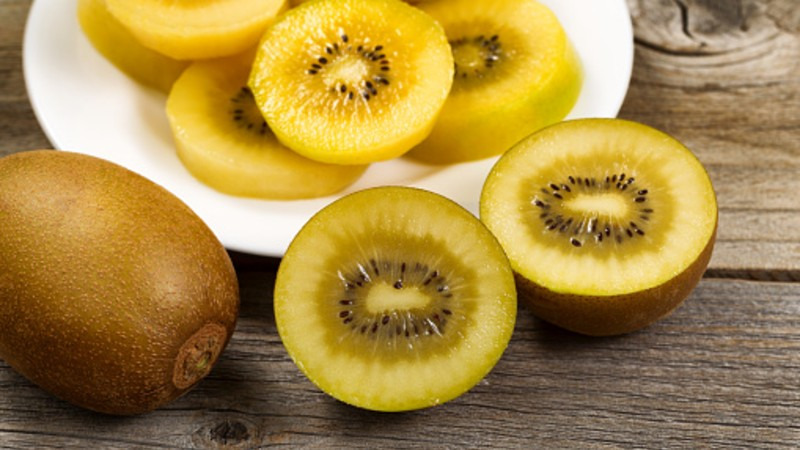
Golden kiwi has a unique flavor and brilliant golden flesh. Golden kiwi adds a silky texture and sweet-tart flavor to yellow fruits.
Golden kiwi is nutrient-dense and healthy. Vitamin C improves immunological function, collagen formation, and antioxidant activity. Fiber helps digestion and weight management in the fruit.
Additionally, golden kiwi contains vitamin E, potassium, and folate. Vitamin E protects cells from harm, while potassium helps maintain heart function and fluid balance. Cell growth requires folate.
Golden kiwi can be eaten alone or added to fruit salads, smoothies, and desserts. Golden Kiwi is refreshing and healthful.
Yellow Plum
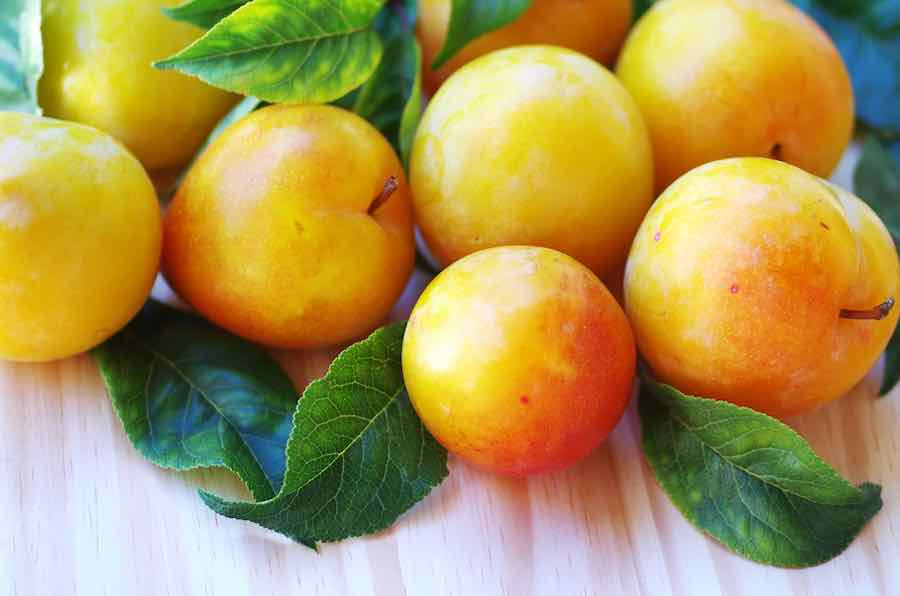
Yellow plums are delicious with their silky exterior and luscious flesh. These tasty little fruits have several health benefits.
Dietary fiber in yellow plums helps digestion, satiety, and intestinal health. They include vitamins C and A. Vitamin A helps the eyes and skin, while vitamin C increases immunity.
Antioxidants in these colorful fruits protect cells from injury and inflammation. Antioxidants prevent chronic diseases and maintain health.
Yellow plums provide sweetness and tanginess to fruit salads, baked items, and fresh eating. Their juicy texture and refreshing flavor make them a great healthful snack. Yellow plums are tasty and nutritious.
Yellow Cherry
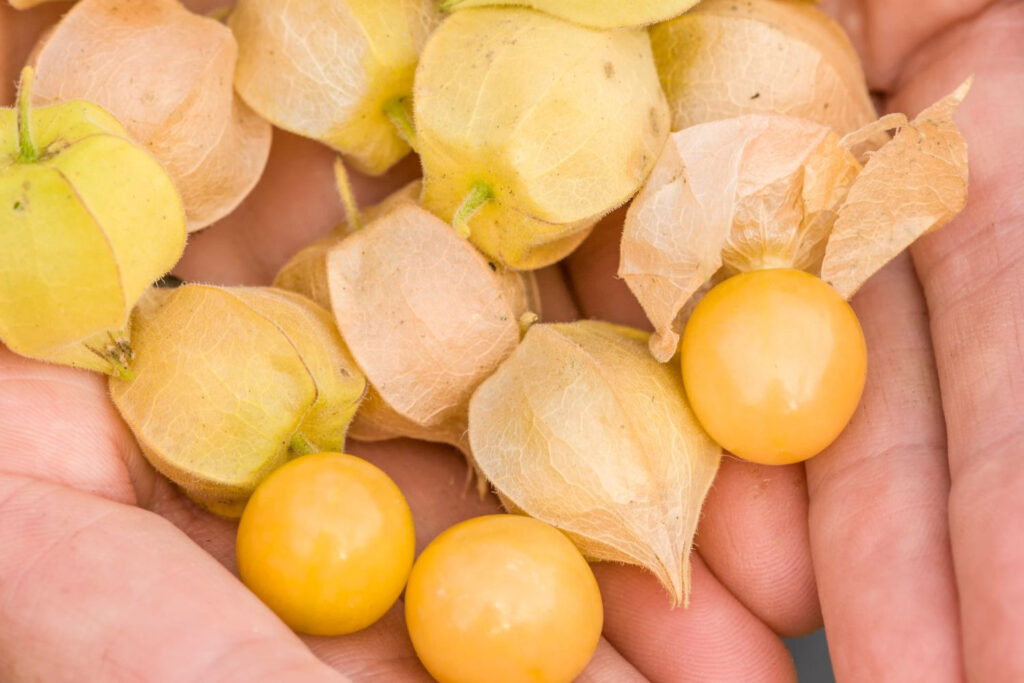
Yellow cherries are delicious and vivid. These bite-sized delights are delicious and healthy.
Yellow cherries are rich in vitamin C and beta-carotene. Antioxidants support immunological function, good skin, and oxidative stress protection. They protect the eyes and may lower chronic illness risk.
Dietary fiber in yellow cherries improves digestion, increases satiety, and supports a healthy digestive tract. They include potassium, which regulates blood pressure and cardiac function.
Yellow cherries bring flavor and color to dishes. Their juicy texture and delicious taste make them ideal for fruit salads, sweets, and even savory foods. Yellow cherries are delicious and healthful.
Yellow Passion

Yellow passion fruit is unusual and wrinkled. This bright fruit is delicious and healthy.
Dietary fiber from yellow passion fruit assists digestion, weight management, and fullness. It contains vitamins A and C, which boost immunity, skin health, and overall well-being.
Yellow passion fruit also has vitamin C and beta-carotene. Antioxidants fight free radicals, reduce inflammation, and improve health.
Yellow passion fruit is adaptable due to its acidic and tropical taste. It can be eaten fresh, added to desserts, smoothies, or sauces and dressings. Yellow passion fruit adds tropical flavor to your dishes.
Yellow Grapefruit
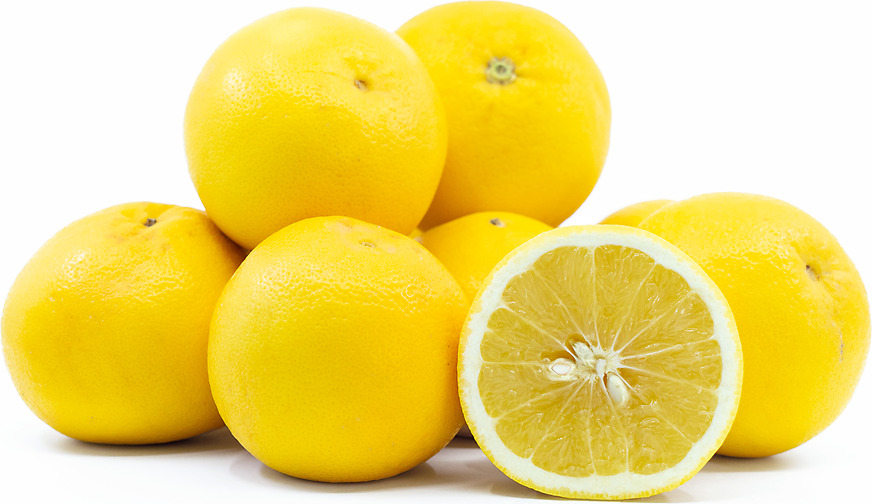
Yellow grapefruit’s zesty, refreshing taste brings sunlight to your taste receptors. This bright yellow fruit is tasty and nutritious.
Vitamin C boosts immunological function, collagen formation, and antioxidant potency in yellow grapefruit. Dietary fiber promotes digestion, maintains a healthy gut, and keeps you satisfied.
Yellow grapefruit also contains flavonoids, which are antioxidant and anti-inflammatory. These chemicals improve general health and may lower chronic illness risk.
Yellow grapefruit provides tang and zest to meals and snacks, whether eaten alone, added to salads, or blended into refreshing beverages. Yellow grapefruit’s exhilarating taste and nutritional benefits make it a healthy and pleasant addition to your diet.
Yellow Raspberry
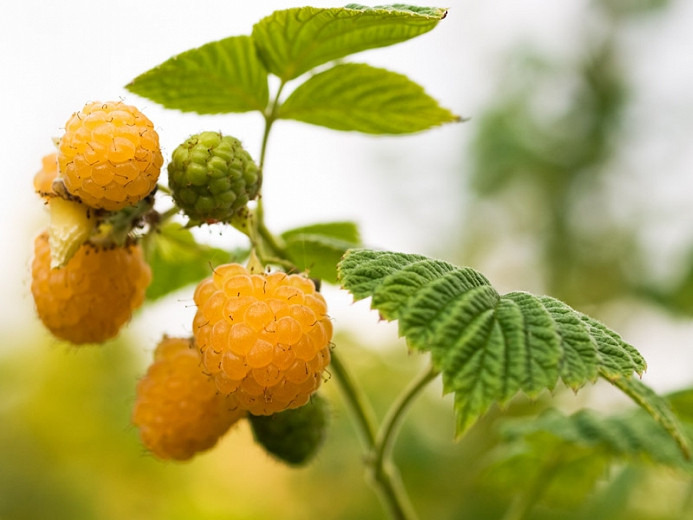
Yellow tomatoes are a great alternative to red tomatoes due to their bright and cheery color. These colorful fruits are healthy and add color to recipes.
Yellow tomatoes are full of antioxidants, especially lycopene. Lycopene offers many health benefits, including heart health and cancer prevention.
Yellow tomatoes also include vitamins A and C, which boost the immune system, promote healthy skin, and act as antioxidants. They also include nutritional fiber, which aids digestion and weight control.
Yellow tomatoes add a milder, sweeter taste to salads, salsas, and sauces. They’re delicious fresh or cooked and add nutrition to dishes. Enjoy yellow tomatoes’ unique flavor and health benefits.
Yellow Fig
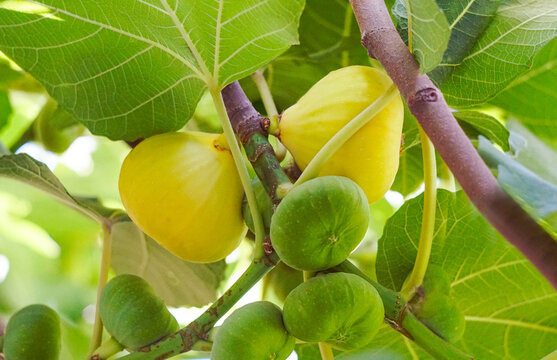
Yellow figs, with their honey-like flavour and silky texture, are a treat. These golden fruits are delicious and healthy.
Yellow figs are high in dietary fibre, which aids digestion, regulates bowel motions, and makes you feel full. Potassium, magnesium, and vitamin K are also in them.
Antioxidants like phenolic compounds in yellow figs protect the body against oxidative stress and inflammation. These antioxidants improve health and may lower chronic disease risk.
Yellow figs bring flavor and nutrition to meals and snacks, whether fresh, dried, or cooked. They’re flexible and delicious since their sweet, soft flesh goes with both sweet and savory meals. Enjoy the flavor and health benefits of yellow figs.
Yellow Guava

Yellow guava, with its tropical scent and brilliant color, is delicious and nutritious. These little, spherical fruits are full of flavor and health advantages.
Vitamin C, found in yellow guava, boosts collagen formation, immunological function, and antioxidant power. Dietary fiber assists digestion, maintains a healthy weight, and promotes gut health.
Yellow guava also contains antioxidants and phytonutrients including lycopene and beta-carotene. These chemicals improve general health and may protect against chronic diseases.
Yellow guava lends a tropical, tangy taste to smoothies, fruit salads, and fresh eating. Yellow guava is refreshing and nutritious.
Yellow Pitaya (Dragon Fruit)
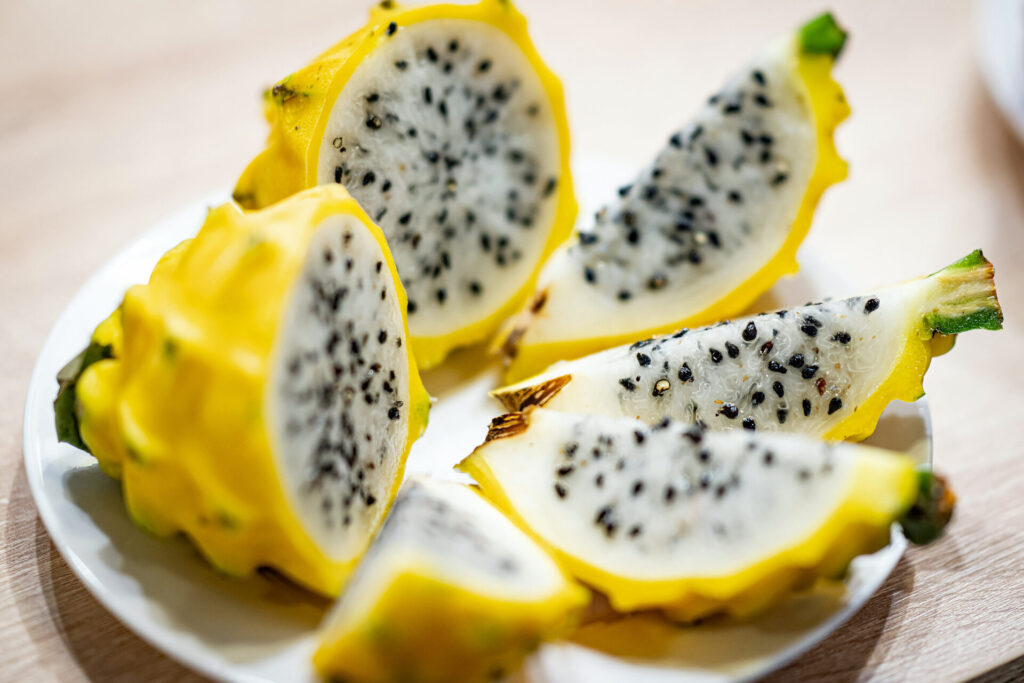
Yellow pitaya, often known as yellow dragon fruit, is both stunning and delicious. Yellow pitaya is beautiful and nutritious, with its vivid yellow peel and white or yellow flesh studded with small black seeds.
Vitamin C in yellow pitaya boosts immunity, collagen formation, and antioxidant power. Dietary fiber assists digestion, promotes gut health, and regulates bowel motions.
Yellow pitaya is low in calories and high in antioxidants including betalains, which reduce inflammation and oxidative stress.
Yellow pitaya lends a tropical, sweet taste to smoothies, fruit salads, and fresh eating. Yellow pitaya is beautiful and nutritious. Enjoy its taste and color.
Yellow Persimmon

Yellow persimmons, with their vivid golden color and rich texture, are a delicious and distinctive persimmon variety. These stunning fruits have several health benefits.
Dietary fiber helps digestion, satiety, and a healthy digestive system in yellow persimmons. They also include vitamins and minerals, including vitamins A and C, which support immune health, skin health, and antioxidants.
Antioxidants like carotenoids in yellow persimmons protect cells and lower the risk of chronic diseases.
Yellow persimmons give a particular sweetness and pleasant texture to your culinary creations, whether eaten fresh, added to salads, or baked. Enjoy yellow persimmons’ exquisite taste and health advantages.
The Cultural Significance of Yellow Fruits
Yellow fruits are important in many cultures and traditions. Yellow fruits are important in many cultures, from religious events to culinary customs.
Many cultures link yellow fruits with abundance, prosperity, and good fortune. Happiness and cheerfulness are associated with their bright color. Oranges and peaches are exchanged at the Lunar New Year in China to wish for a prosperous year.
Yellow fruits are important in religious rites. Bananas and mangoes are offered in Hindu prayers. Auspicious fruits are thought to delight deities and provide blessings.
Yellow fruits are also revered in traditional medicine for their therapeutic powers. Yellow fruits like turmeric and lemons are revered for their medicinal properties in Ayurveda. Traditional medicines exploit turmeric’s anti-inflammatory effects. However, lemons cleanse and treat stomach disorders.
Yellow fruits are very important in culinary traditions. Yellow fruits are used in many traditional recipes for their flavor and texture. Yellow mangoes lend sweetness and tropical flavor to Thai recipes like mango sticky rice. Yellow plantains, which can be fried, baked, or mashed, are a versatile ingredient in Latin American cuisine.
Yellow fruits are more than just pretty and tasty. Cultural identity, customs, and beliefs are inextricably connected with them. Yellow fruits symbolize nature, food, and culture.
Yellow Fruits and Health

Prevention and Wellness
Yellow fruits improve health and well-being. Their brilliant color indicates vitamins, minerals, and antioxidants that support a healthy lifestyle.
Powerful nutrients: Bananas, pineapples, and yellow peppers are nutrient-rich. They contain vitamins A and C, which boost immunity and skin and tissue health. Fibre from these fruits aids digestion and gut health.
Heart Health: Flavonoids and antioxidants in yellow fruits like lemons and grapefruits support cardiovascular health. These chemicals reduce inflammation, blood pressure, and blood flow, lowering heart disease risk.
Eye Health: Yellow bell peppers and mangoes are rich in eye-healthy vitamins A, lutein, and zeaxanthin. They prevent AMD and improve vision.
Common Concerns and Myths
Yellow fruits are healthy, but it’s necessary to address common concerns and dispel falsehoods.
Sugar Content: Yellow fruits’ sugar level may concern some. Fruits contain natural sugars, however, dietary fiber inhibits sugar absorption and stabilizes blood sugar. Yellow fruits in a balanced diet are usually safe.
Allergy Issues: Banana and pineapple allergies are unusual. Food sensitivities and allergies should be known and treated by a doctor.
Acidic nature: Lemons and grapefruits taste acidic yet alkalize the body. They assist health and pH equilibrium after metabolism.
Yellow fruits are nutritious and might improve your health. Consider allergies and ask a doctor for dietary advice. Yellow fruits are delicious and help a healthy lifestyle.
Conclusion
Yellow fruits give color and health advantages to our menus. These superfoods boost immunity, heart health, vision, and digestion. Yellow fruits prevent disease and provide vitamins, minerals, and antioxidants. As with any diet, yellow fruits should be addressed and debunked. They contain natural sugars, however, their fiber regulates blood sugar. When eating yellow fruits, allergies and food sensitivities should be considered. Understanding how yellow fruits alkalize might help you comprehend their health effects.



